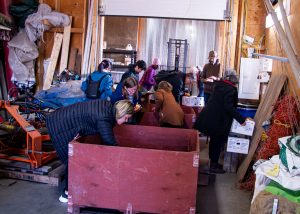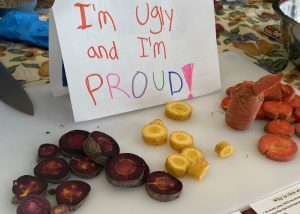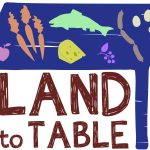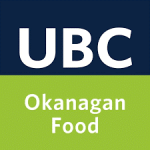 |
 |
 |
| UBCO students sorting apples at Curlew Orchard. | “Ugly” carrot tasting at the UBCO farmer’s market. | Apple tasting with Chef Brad Vigue of UBC O Food Services and apple supplier Patrick Allen from Curlew Orchard. |
“Every decision we make about food is a vote for the kind of world we want to live in.” ~Francis Moore Lappe
The UBCO Local Food Values Dialogues are a way for the UBC Okanagan Community to more clearly identify and define the environmental and social values our university uses when purchasing local food from Okanagan food producers. Through these three dialogues, participants will think through what these values are, and how they could be identified on farms in the Okanagan bioregion, that grow some of the food that is eaten on campus.
-
-
- Sustainability of organic/regenerative agriculture, biodiversity conservation, and salmon habitats
Guest speakers: Eva-Lena Lang, Organic BC, Lia McKinnon, Okanagan Similkameen Stewardship (OSS), Andrea McDonald, Salmon-Safe BC
2:00 pm – 3:15 pm, Thursday, March 9 - Justice for farm workers, farmers and other food producers, particularly those representing Indigenous and other diverse groups
Guest speakers: Robyn Bunn, Radical Action with Migrants in Agriculture (RAMA), Ari Westhover, National Farmers Union (NFU).
2:00 pm – 3:15 pm, Thursday, March 16 - How can we at UBCO begin to confirm these values in our ongoing food value chain relationships?
Guest speakers: David Speight, Culinary Director, UBC, Brad Vigue, Executive Chef UBCO; Emily Jubenvil, Shuswap Organics, Patrick Allen, Curlew Orchard.
2:00 pm – 3:15 pm, Thursday, March 23
- Sustainability of organic/regenerative agriculture, biodiversity conservation, and salmon habitats
-
Register for our Local Food Values Dialogue Series by clicking here.
Participation can be via Zoom or in-person at the Institute for Community Engaged Research (ICER), in the ARTS building, Arts 368, at UBC’s Okanagan campus.
This series supports the work of the UBCO Food Services/Land to Table Network Local Food Procurement Pilot Project that links UBCO’s food consumers to food producers from the Okanagan bioregion.
If you have any questions, please email: local.food@ubc.ca
Background information:
The food value chain under discussion in this Dialogue Series was developed through a UBCO/ L2T Local Food Procurement Pilot Project that began in September of 2021. Through this pilot project, UBCO campus food system actors (including as student consumers and advocates; staff from UBCO Food Services and UBCO Campus Health & Wellness; faculty from the Institute for Community-Engaged Research (ICER); and others) were provided with increased access to local food through the activities of the Land to Table (L2T) network’s regional food system members (including food producers, processors, aggregators and distributors).
Inspiration for this pilot project has come from both sides of the food value chain. The Land to Table network, in its quest to build a thriving, healthy and resilient regional food system, has been hearing from small- and medium- sized farmers about the challenges they face in accessing stable markets for their food products. This has culminated in calls for an institutional champion to step forward locally to provide that market and in doing so, support the rebuilding of a regional food value chain, including the reinvestment into any missing links, be they actors, processes or infrastructure.
This call for a champion was answered when one of the Okanagan’s largest institutions, UBCO, decided not to renew its contract with Aramark, its Food Services provider, in 2018, opting instead for independent management of its own Food Services. UBCO now holds greater power over its food procurement decisions, which has permitted the development of a ‘demand pull’ based on food values (as opposed to the ‘supply push’ that is more common in global food supply chains), as currently summarized in the university’s draft Food Vision and Values.
This series is hosted by UBCO Food Services, the Land to Table (L2T) Regional Food System Network with support from the Institute for Community Engaged Research and students working as Local Food Champions.
 |
|
 |
